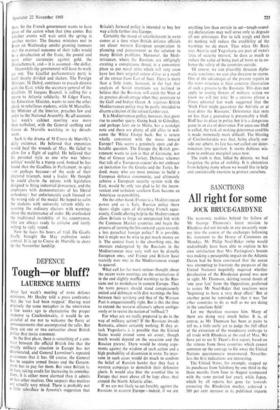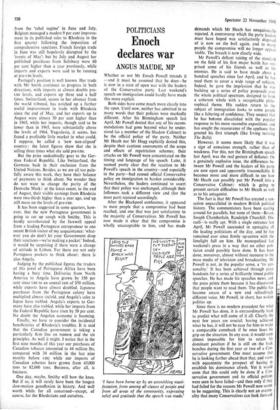All right for some
SANCTIONS JOCK BRUCE-GARDYNE
The economic realities behind the failure of Mr George Thomson's latest mission to Rhodesia did not intrude in any unseemly man- ner into the course of the exchanges following his statement to the House of Commons on Monday. Mr Philip Noel-Baker (who would undoubtedly have been able to explain to his own satisfaction that Mrs Partington's broom was making a perceptible impact on the Atlantic Ocean had he been convinced that the ocean was attempting to frustrate the purposes of the United Nations) hopefully inquired whether devaluation of the Rhodesian pound was now in sight. Mr Thomson, skirting round shouts of 'one year late' from the Opposition, preferred to assure Mr Noel-Baker that sanctions were 'beginning to have a very deep effect.' But at another point he reminded us that it was 'for ether countries to do as well as we are doing in the sanctions field.'
Let me therefore reassure him. Many of them are doing very much better. It is, of course, as Mr Thomson has been at pains to tell us, a little early yet to judge the full effect of the extension of the mandatory embargo to all trade with Rhodesia at the end of May. We have yet to see U Thant's first report, based on the returns from those countries which cannot summon up the courage to file away the United Nations questionnaire unanswered. Neverthe- less the first indications are interesting.
The United States, for example, stepped up its purchases from Salisbury.by one third in the
three months from June to August (compared with the same period last year), while Japan, which by all reports has gone far towards cornering the Rhodesian market, achieved a 300 per cent increase in its published imports
• from the 'rebel regime' in June and July. Belgium managed a modest 9 per cent improve- ment in its published sales to Rhodesia in the first quarter following the imposition of comprehensive sanctions. French foreign trade in June was still hopelessly disrupted by the 'even•ts of May'; but by July and August her published purchases from Salisbury were 60 per cent higher than a year previously, •while imports and exports were said to be running at pre-um levels.
Portugal's position is well known. Her trade with Mr Smith continues to progress in both directions, with imports at almost double pre- lim levels, and exports up three and a half times. Switzerland, secure in her absence from the world tribunal, has notched up a further useful improvement in trade with Rhodesia since the end of May, and her exports up to August were almost 50 per cent higher than in 1965, while her imports, though said to be lower than in 1965, were substantially above the levels of 1964. Yugoslavia, it seems, has found a profitable little market in what could, I suppose, be called a 'new non-aligned' country : the latest figures show that she is selling three times what she sold pre-uDi.
But the prize undoubtedly goes to the Ger- man Federal Republic. Like Switzerland, the Germans bask in their exclusion from the United Nations. Besides, as we are all too pain- fully aware this week, they have their balance of payments to think about. No wonder they do not want to change the parity of the Deutsche Mark : at the latest count, to the end of August, their visible earnings from Rhodesia were two-thirds higher than a year ago, and up still more on the levels of pre-uDr.
It has been suggested in some quarters, how- ever, that the new Portuguese government is going to cut up rough with Smithy. This is hardly corroborated by the farewell appeal from a leading Portuguese entrepreneur to one recent British visitor of my acquaintance: 'what- ever you do don't let your Government drop their sanctions—we're making a packet.' Indeed, it would be surprising if there were a change of attitude in Lisbon. For there are not only Portuguese pockets to think about: there is also Angola.
Judging by the published figures the traders of this jewel of Portuguese Africa have been having a busy time. Deliveries from North America to Angola have grown by 350 per cent since Urn to an annual rate of $50 million, while exports have almost doubled. Japanese purchases from the Portuguese colony have multiplied almost sixfold, and Angola's sales to Japan have trebled. Angola's exports to Ger- many have also trebled, while her imports from the Federal Republic have risen by 50 per cent. No doubt the Angolan economy is booming.
Finally, we have to consider the incidental beneficiaries of Rhodesia's troubles. It is said that the Canadian government is taking a particularly firm line on NIBMAR and the six principles. As well it might. I notice that in the first nine months of this year our purchases of Canadian tobacco amounted to 44 million lbs, compared with 34 million in the last nine months before UDI; while our imports of Canadian asbestos have grown from 65,000 tons to 82,000 tons. Business, after all, is business.
One day, maybe, Smithy will bow the knee. But if so, it will surely have been the longest slow-motion genuflexion in history. And well worth while for all concerned—except, of course, for the Rhodesians and ourselves.



































 Previous page
Previous page